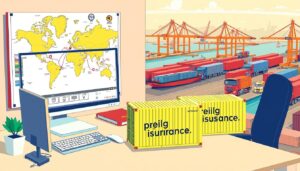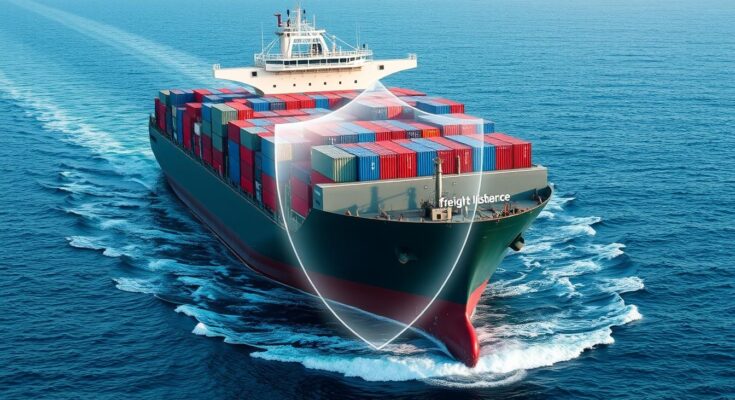As a freight broker, you help move goods from one place to another. But, the transportation industry comes with its own set of risks. So, is freight broker insurance really needed? This article will explore the importance of this coverage and if it’s right for your business.
Key Takeaways
- Freight broker insurance protects your business from financial losses and claims.
- It’s important to know the different types of coverage, key terms, and legal needs for freight brokers.
- Understanding your business’s risks and size helps choose the right insurance.
- Contingent cargo coverage and broker’s errors and omissions insurance are key parts of a good plan.
- Things like your experience, claims history, and policy exclusions can affect your insurance costs.
Understanding the Basics of Freight Broker Insurance

As a freight broker, getting to know insurance can be tough. It’s key to understand freight broker insurance basics. This helps protect your business and follow industry rules. Let’s explore the main points of this important coverage.
Types of Coverage Available
Freight brokers can choose from many insurance policies. These include contingent cargo coverage for transit damages or losses. And broker’s errors and omissions insurance for professional negligence claims.
Also Read: How Much Is Wisdom Teeth Removal Without Insurance.
Key Insurance Terms for Brokers
- Primary coverage: The first layer of insurance for a specific risk or exposure.
- Secondary coverage: Extra insurance that steps in when primary coverage is used up or doesn’t apply.
- Deductible: The amount you pay first before insurance starts paying.
- Limit of liability: The most an insurance company will pay for a claim.
Primary vs Secondary Coverage
Freight brokers need to know the difference between primary and secondary coverage. Primary coverage, like motor truck cargo insurance, is the first defense against claims. Secondary coverage, like contingent cargo coverage, adds extra protection when primary coverage is not enough or doesn’t apply.
| Coverage Type | Primary | Secondary |
|---|---|---|
| Contingent Cargo | ✗ | ✓ |
| Broker’s Errors and Omissions | ✓ | ✗ |
Knowing about different coverages and the primary vs secondary policy difference helps brokers. They can then make smart choices to protect their business and follow industry rules.
Legal Requirements and Compliance for Freight Brokers
Freight brokers must follow strict rules to succeed in the transportation industry. These laws protect both the brokers and their clients. They ensure fairness and keep the industry honest.
Freight Broker Bond Requirements
Freight brokers need to have a surety bond. This bond is a financial promise to follow federal rules. It costs $75,000 and helps pay if the broker can’t do their job.
Transportation Broker Protection
Brokers need protection too. This includes insurance for liability, cargo, and more. It keeps them safe and their clients protected. The right insurance is essential.
Following rules shows a broker’s commitment. It lets them work confidently and serve their clients well. This is key to success.
Also Read: Get Diastasis Recti Surgery Covered By Insurance Guide.
Do You Need Freight Broker Insurance for Your Business

Deciding if your freight brokerage needs insurance is key. Several factors, like risk, business size, and industry rules, play a role. Knowing these can help protect your business and money.
Risk Assessment Factors
Freight brokers face many risks, like cargo damage and liability claims. It’s important to look at your operations, clients, and transport methods. The goods you move, routes, and carrier contracts also matter.
Business Size Considerations
- Bigger freight brokerages need strong freight forwarder insurance and cargo legal liability policies due to more risks.
- Smaller companies might have less risk, but they also need good coverage to protect their business.
Industry-Specific Requirements
Some industries or clients require specific insurance for freight brokers. For example, those working with the government or military might need higher standards. Knowing industry rules and client needs helps choose the right insurance for your business.
| Risk Factor | Considerations | Recommended Coverage |
|---|---|---|
| Cargo Damage and Loss | Types of goods transported, transportation modes, and contract terms with carriers | Cargo legal liability policies |
| Liability Claims | Client base, contract terms, and industry regulations | Freight forwarder insurance |
| Business Size | Complexity of operations, exposure levels, and client requirements | Tailored insurance solutions based on company size |
By looking at your risks, business size, and industry needs, you can decide if freight broker insurance is right for you. The right coverage can protect your business.
Contingent Cargo Coverage: Your Safety Net
As a freight broker, keeping your clients’ cargo safe is key. But, even with careful planning, unexpected issues can happen. That’s when contingent cargo coverage becomes a vital safety net for your business.
Contingent cargo coverage is a special cargo insurance for freight brokers. It protects against financial losses due to damage, theft, or other unexpected events. These can happen when the cargo is in the care of your transportation partners.
Key Benefits of Contingent Cargo Coverage
- Safeguards your business from liability claims by your clients
- Covers losses when the primary carrier’s insurance is insufficient or unavailable
- Protects your contingent cargo interests, even when you don’t have direct control over the transportation process
- Ensures compliance with industry regulations and contractual obligations
Contingent cargo coverage makes freight brokers feel secure. It reduces financial risks and boosts your reputation. It shows you’re committed to reliable and trustworthy services for your clients.
A secure freight transport scene, featuring a large cargo ship surrounded by a protective shield symbolizing coverage, with containers labeled “freight broker insurance,” set against a calm ocean backdrop, illustrating safety and assurance in logistics.
In the fast-paced world of freight brokerage, contingent cargo coverage is key. It helps you handle industry challenges with confidence. You know your business is safe from problems.
Also Read: Cost of Chest X-Ray Without Insurance: What to Expect.
Broker’s Errors and Omissions Insurance Explained

As a freight broker, you’re key in the logistics chain. You connect shippers with carriers for smooth delivery. But, you face risks of errors or oversights that could cost a lot. Broker’s errors and omissions (E&O) insurance is your safety net.
Common Claims Scenarios
Broker’s E&O insurance covers many scenarios where your actions could lead to financial loss for clients. These include:
- Failure to vet or monitor a carrier, causing cargo damage or loss
- Mistakes in booking or scheduling, causing delivery delays or missed deadlines
- Errors in paperwork processing, such as incorrect bills of lading or shipping labels
- Negligence in handling customer inquiries or addressing customer complaints
Coverage Limitations
While broker’s E&O insurance offers broad protection, it has limits. It doesn’t cover claims for:
- Intentional or fraudulent acts by the broker
- Bodily injury or property damage (which would be covered by freight broker liability insurance)
- Failure to maintain required licenses or comply with regulatory requirements
Policy Exclusions
Broker’s E&O policies also have exclusions. Claims related to war, terrorism, or radioactive contamination are often excluded. It’s vital to review policy details to ensure your business is well-protected.
Understanding common claims, coverage limits, and exclusions helps protect your freight brokerage business. It also helps reduce the financial impact of possible errors or omissions.
Motor Truck Cargo Insurance vs Freight Broker Liability

It’s important to know the difference between motor truck cargo insurance and freight broker liability insurance. These policies serve different needs in the transportation industry.
Motor Truck Cargo Insurance protects against losses or damages to goods. It covers theft, accidents, and other unexpected events during transport. It’s key for businesses with their own truck fleets.
Freight Broker Liability Insurance is for brokers and logistics providers. It covers claims related to their services. This includes damages, delays, and other issues during transport. It’s vital for those arranging freight without owning the assets.
| Motor Truck Cargo Insurance | Freight Broker Liability Insurance |
|---|---|
| Covers physical loss or damage to goods during transportation | Covers liability claims related to the broker’s services |
| Protects the shipper or carrier | Protects the freight broker or logistics provider |
| Mandatory for businesses that own or operate their own fleet | Often required for freight brokers to comply with regulations |
Knowing the difference between these insurances is key for transportation businesses. Choosing the right coverage protects them from unique risks. This applies to carriers, shippers, and freight brokers.
Cost Factors and Premium Calculations
Understanding the cost factors and how premiums are calculated is key for freight broker insurance. Several elements influence insurance rates for freight brokers. Knowing these can help you choose the right coverage and maybe lower your premiums.
Insurance Rate Determinants
Insurance rates for freight brokers depend on several factors. These include the size of your business, your experience, the freight volume and value, and your claims history. Brokers with a safe and reliable record get better rates. Those with claims history may pay more.
Ways to Reduce Premiums
- Maintain a clean claims history by implementing robust risk management strategies and procedures.
- Consider increasing your deductibles, which can lower your monthly or annual premium payments.
- Shop around and compare quotes from multiple insurance providers to find the most competitive rates for your freight broker insurance and transportation broker protection needs.
- Explore possible discounts, such as those for brokers with larger book sizes or those who bundle their coverage with other insurance policies.
By understanding the cost factors and finding ways to lower premiums, you can get the best freight broker insurance for your business. This ensures your business is protected while keeping costs down.
| Factor | Impact on Premiums |
|---|---|
| Business Size | Larger brokerages may benefit from economies of scale and negotiate more favorable rates. |
| Claims History | A clean claims record can lead to lower premiums, while a history of claims may result in higher rates. |
| Freight Volume and Value | Brokers handling higher-value or larger volumes of freight may face increased insurance costs. |
| Deductible Levels | Raising deductibles can lower monthly or annual premium payments. |
Choosing the Right Insurance Provider
Choosing the right insurance provider is key for freight forwarder insurance or cargo legal liability policies. The provider you pick affects your coverage and support. As you explore freight broker insurance, consider these factors for a smart choice.
Industry Expertise
Find an insurance provider with a strong background in freight and logistics. They should know the risks and challenges of freight brokers well. This expertise is key for good coverage and claims handling.
Comprehensive Policy Options
Freight broker insurance includes various coverage types. Make sure your provider offers a wide range of options. This way, you can create a policy that fits your business perfectly.
Customer Service and Claims Support
When a claim happens, you need a provider that acts fast and well. Look for a company known for great customer service and quick, fair claims resolution.
| Key Considerations | Why They Matter |
|---|---|
| Industry Expertise | Ensures the provider understands the unique risks and challenges facing freight brokers, leading to more tailored coverage. |
| Comprehensive Policy Options | Allows you to build a customized insurance solution that meets the specific needs of your freight brokerage. |
| Customer Service and Claims Support | Provides peace of mind and a reliable partner when dealing with claims, ensuring a smooth process. |
By looking at these factors, you can find an insurance provider that protects your business well. They offer the coverage and support you need.
“Choosing the right insurance provider can make all the difference when it comes to protecting your freight brokerage business.”
Conclusion
In the world of freight brokerage, the right insurance is key. We’ve looked at the basics of freight broker insurance and the legal needs. The main point is that freight broker liability insurance is vital for any business in this field.
Every freight broker faces risks, from lost or damaged cargo to mistakes. But, the right insurance can protect your business and clients. It’s important to ask if you need freight broker insurance for your business when you’re in the freight brokerage world.
As you plan ahead, think about your business’s risks and size. Make sure you meet all the industry rules. This way, your business will be ready for anything and keep serving your clients well.
FAQ
What is freight broker insurance and why is it important?
Freight broker insurance protects businesses that arrange goods transport. It’s key because it covers risks like cargo damage or loss. It also handles errors and omissions.
What types of coverage are available for freight brokers?
Freight brokers can get several insurances. These include contingent cargo coverage, broker’s errors and omissions insurance, and motor truck cargo insurance. Each type guards against different risks.
What are the legal requirements for freight brokers regarding insurance?
Freight brokers must have a surety bond for financial protection. Some states also have specific insurance rules for legal operation.
How do I determine if my freight brokerage business needs insurance?
Think about your business size, services, cargo value, and risks. Also, consider industry rules and your risk assessment.
What is contingent cargo coverage, and why is it important for freight brokers?
Contingent cargo coverage protects freight brokers when the carrier’s insurance is lacking. It acts as a safety net against cargo damage or loss.
What is broker’s errors and omissions insurance, and how does it differ from other types of freight broker coverage?
Broker’s errors and omissions insurance protects against professional negligence. It’s different because it covers the broker’s services, not just cargo.
How do motor truck cargo insurance and freight broker liability insurance differ, and when is each type of coverage appropriate?
Motor truck cargo insurance protects the carrier against cargo damage. Freight broker liability insurance covers the broker’s liability. Both may be needed, depending on the business.
What factors influence the cost of freight broker insurance, and how can I potentially reduce my premiums?
Premiums are based on business size, claims history, coverage types, and cargo value. To lower costs, consider higher deductibles, risk management, and compare rates.
How do I choose the right insurance provider for my freight brokerage business?
Look at the provider’s expertise, coverage options, financial stability, and customer service. Compare quotes to find the best value.



